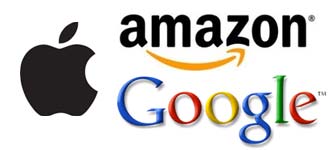Media is changing. Today, consumers have the ability to view nearly all forms of content on devices that fit in the palm of their hands.
Unsurprisingly, many of these innovations are coming from technology companies rather than media companies.
The three largest companies in this space are Apple, Google, and Amazon. To a consumer, each company plays a very different role. Apple is a hardware manufacturer, Google is a search-engine, and Amazon is the e-commerce leader. However, each of these companies have something in common -- digital media. 
From a consumer's perspective, Apple is a hardware company. It's current line-up includes computers, MP3 players, phones, and tablets. Over time, Apple has built a near-perfect digital media ecoysystem where it's hardware interacts with it's software, which then connects to a vast media library through the iTunes Store.
Similarly, with Google's nearly 4-year old acuqisition of YouTube and it's fairly recent Android platform, the company is agressively stepping into the digital media space.
Amazon has also sharply increased it's stake in this space with it's MP3 Store, it's Video on Demand product, and the Kindle.
Even though these companies are large in size, they're not media companies. Most of their original content is purely promotional. So, why are technology companies innovating for the media industry?
The answer is audience, competition, and delivery. Cumulatively, each of these companies reach hundreds of millions of people and deliver media with flawless user-experience.
Similar to any other industry, the media and entertainment space is extremely competitive. A great example is this week's ABC-7 and Cablevision dispute. They both need consumers to generate revenue. Yet, they frustrated their users by not reaching an agreement on time.
When an external industry innovates for another industry, consumers win. Had TiVo not created the DVR, people wouldn't be able to view their favorite shows at a time of their liking. Had Apple not created the iPod, consumers would not have had the ability to seamlessly view their content on a mobile device. Had Amazon not innovated on the e-book model, consumers would have to wait until they were near a network-connected source to download a digital book. This is innovation at it's finest.
- YouTube recently introduced closed captioning on all of it's videos. For customers with hearing difficulties, this is a positive step forward.
- Apple is in talks with studios to reduce the per-episode pricing to $0.99. This may reduce the price-to-entry for many consumers.
- Amazon, not too long ago, released the Kindle DX, a large-screen digital reading device. Despite mediocre reviews, it's a chance to innovate and deliver better products.
Many consumers are hesitant to adapt to these new products. However, when you have the world's leading consumer-facing companies working on solutions, it's time to take a step-back and accept that innovation will never stop. By definition, it will continue to move forward.